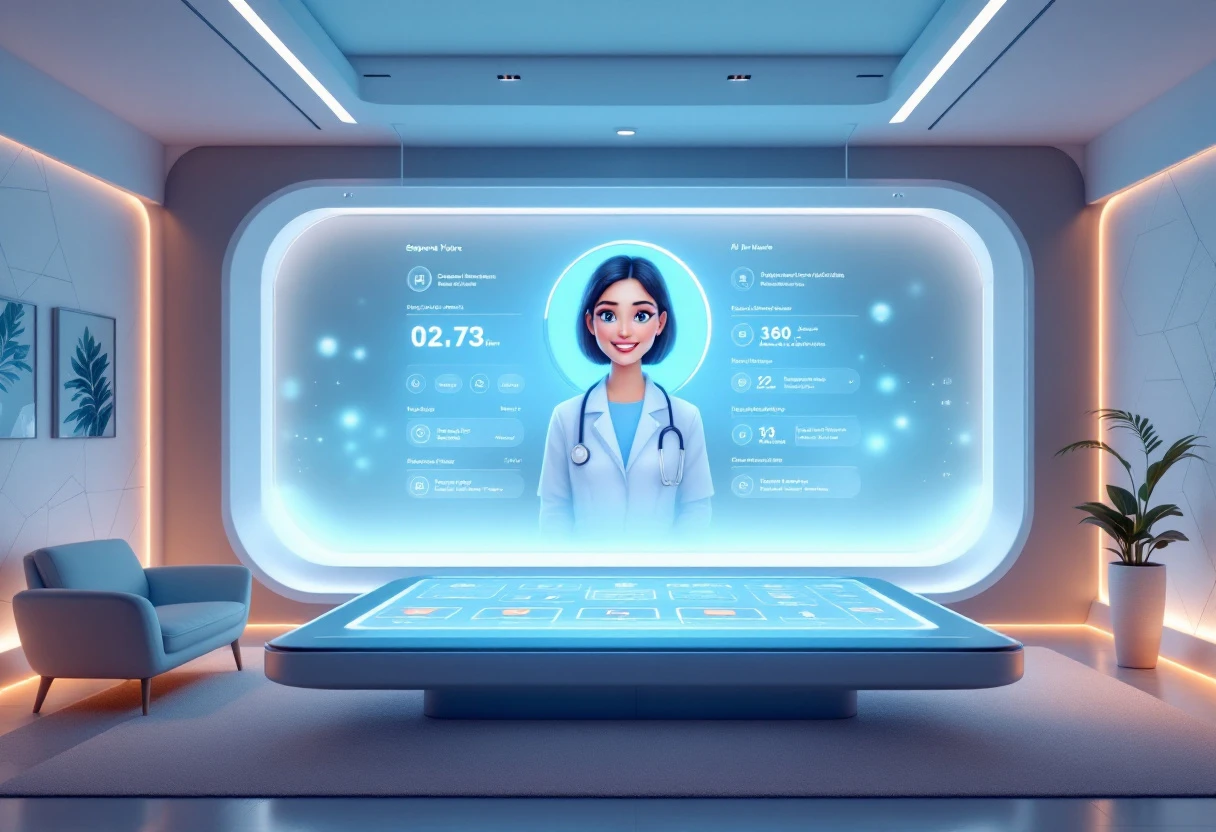
Are you facing challenges in managing patient interactions and appointments at your medical practice? The integration of a medical AI receptionist can revolutionize your approach, improving efficiency and patient satisfaction while reducing operational costs. Explore how this advanced technology can transform your practice into a more profitable and patient-centered environment.
Every medical practice faces the challenge of efficiently managing patient appointments and inquiries. According to recent studies, over 30% of phone calls to medical offices go unanswered, often leading to missed appointments and patient frustration. This lack of accessibility can lead to a loss of revenue, as missed appointments can cost practices significantly in both time and money.
Additionally, traditional receptionist models have operational costs that can run into thousands annually. Staff turnover, training costs, and the inefficiencies of manual scheduling only add to the burden. Practices struggle to engage with patients effectively, which often culminates in dissatisfaction as patients wait too long for answers or services. This cycle stresses both the staff and the patients.
Integrating a medical AI receptionist can provide a reliable solution to these challenges. These systems are designed to handle routine inquiries, manage schedules, and significantly reduce wait times. For instance, a recent case study involving a group of primary care providers showed that after implementing an AI receptionist, they achieved a 40% reduction in missed calls. This allowed their human staff to focus on more complex patient needs while the AI managed simple inquiries.
Beyond just handling calls, an AI solution can provide 24/7 service availability, meaning patients can receive answers to their questions at any time. The AI's ability to learn from interactions allows it to improve over time, becoming more adept at understanding patient needs. As one medical professional pointed out,
“Using AI has not only improved our patient satisfaction rates but has also cut down on our operational costs.”
The impact of adopting AI solutions is already apparent in various medical practices. Facilities that have transitioned to AI receptionists report an increase in patient engagement and streamlined processes. For example, a dental clinic integrated a *medical AI receptionist* and saw a transformation: the clinic reported a 50% reduction in appointment scheduling errors and an improvement in overall patient satisfaction ratings.
Surveys indicate that practices utilizing AI see enhanced operational efficiency, allowing them to focus more on patient care rather than administrative tasks. Key benefits include:
For practices looking to grow and enhance their service offerings, understanding the importance of AI technology in healthcare is crucial. Transitioning to an AI-powered solution can turn a struggling practice into a profitable hub for patient care.
Interested in transforming your patient interactions? Explore the transformative nature of AI Front Desk solutions to boost your practice's efficiency and patient satisfaction. More details can be found at AI Front Desk.

The concept of a white label AI receptionist allows medical practices to adopt advanced technology without needing to develop it from scratch. By rebranding a flexible AI solution, practices can enhance their customer engagement while projecting a professional identity. This translates to a seamless integration of automated reception services that handle scheduling, inquiries, and even follow-ups, all under the practice's unique brand name.
With many healthcare professionals focusing on patient care, implementing such a system offers a crucial advantage. According to recent studies, practices that use automated solutions report a 30% increase in operational efficiency. This allows medical staff to concentrate their efforts where they matter most—on patients. The choice of a white label solution often minimizes the hefty investments typically associated with adopting new technologies, paving the way for smoother transitions and better resource allocation.
Enrolling in a white label AI receptionist program is straightforward. Here’s a simple breakdown of the steps involved:
This integration can be completed quickly, often in a matter of weeks, with minimal disruption to everyday operations. Many practices benefit from adopting a virtual receptionist system, as it streamlines operations and enhances service delivery.
One of the standout features of a white label AI receptionist program is its flexible pricing structure. Different practices can tailor the program to fit their budgets and client expectations. Typically, there are several pricing options:
This flexibility enables small practices or startups to adopt the technology without overcommitting financially. As the practice grows, it's possible to adjust the service level and investment, ensuring that the AI receptionist remains a valuable asset.
“Embracing a white label AI solution can significantly transform how medical practices interact with patients, leading to higher satisfaction and better outcomes.”
Furthermore, ongoing analysis reveals that 70% of patients appreciate automated communication, especially for appointment reminders and follow-ups. Practices adopting this technology also find that they can cater better to patient needs, all while efficiently managing resources. To get started on transforming your practice, consider exploring the options available at AI Front Desk and see how a medical AI receptionist might just be the game-changer your practice needs.
For medical practices, being available around the clock is a significant advantage. A medical AI receptionist can engage patients anytime, instantly addressing their needs. This not only increases patient satisfaction but also enhances operational efficiency. Imagine a scenario where a patient can book an appointment at midnight or ask a question about their prescription without waiting for office hours. This level of accessibility breeds loyalty and trust.
Recent statistics indicate that 70% of patients prefer scheduling appointments outside of traditional hours. By implementing a medical AI receptionist into your practice, you open the door to enhanced after-hours service. Additionally, it manages basic queries, such as appointment confirmations and directions, allowing your staff to focus on more complicated tasks.
Traditional phone systems can leave patients frustrated, especially during peak hours. Medical AI receptionists excel at intelligent message-taking and can handle multiple inquiries simultaneously. For instance, while one patient is asking about test results, another can schedule an appointment, all without needing a human operator.
In a case study involving a busy specialty clinic, after introducing an AI receptionist, they reported a 50% reduction in call waiting times. The AI system could process up to 100 concurrent calls, far surpassing what a human receptionist could achieve. Such enhancements in patient interaction do not only improve satisfaction but can also lead to increased patient retention and referrals. For practices considering this shift, exploring AI communication solutions is essential.
Another compelling advantage of using a medical AI receptionist is its ability to gather and analyze patient data. Real-time data reports on inquiries, scheduling patterns, and patient feedback help practices fine-tune their services. This results in smarter decision-making based on actionable insights.
“The true power of AI lies not just in automation, but in its capability to enhance the human decision-making process.”
Moreover, leveraging these insights leads to improved service offerings—practices can tailor their services to meet actual patient demands. Consider that practices using data-driven strategies have seen 30% improvements in operational efficiency. To gain further clarity on implementation, read about developing an AI implementation strategy that aligns with your practice’s goals.
By integrating a medical AI receptionist into your practice, you’re not just adopting a new technology. You’re reshaping patient interactions, improving service delivery, and ultimately transforming your practice into a more profitable hub that meets modern demands.

Labor costs form a significant part of any medical practice's budget. Employing a medical AI receptionist can drastically reduce these costs through automation and efficiency. For instance, traditional front desk staff might handle calls, schedule appointments, and send reminders manually, thus demanding full-time salaries and benefits. In contrast, an AI receptionist operates around the clock, eliminating the need for multiple full-time employees. Utilizing AI technology can reduce payroll expenses by up to 30%. This not only frees up resources but allows staff to focus on more complex tasks that require human interaction.
Consider a hypothetical medical office with three receptionists. If they each earn about $40,000 annually, the total payroll comes to $120,000. By transitioning to an AI solution like AI Front Desk, practices can save $36,000 each year purely on payroll. Those savings can be redirected to enhance patient care or invest in additional services, improving the overall profitability of the practice.
Appointment management is crucial in any medical practice. With a significant portion of missed appointments, offices face lost revenue. Traditional systems for scheduling can lead to confusion and errors. AI-powered systems can significantly streamline this process. They automate appointment confirmations and reminders via text or email, reducing missed appointments by up to 40%. This translates to increased appointments and, consequently, higher income.
For example, if a practice typically conducts 200 appointments a month with a 20% no-show rate, that's 40 missed opportunities for revenue. With AI handling reminders effectively, this number can drop to as low as 12. If each appointment is valued at $100, this reduction results in an additional $2,800 in monthly revenue. Over a year, that’s a substantial boost to the bottom line.
The efficiency of patient interactions directly influences a practice's profitability. An AI receptionist can manage inquiries, schedule appointments, and even handle basic paperwork. This level of service not only enhances the patient experience but also increases operational efficiency. By implementing features like automated responses, practices can ensure that patients receive timely and accurate information.
Across various sectors, implementing AI in customer interactions has shown an improvement in satisfaction rates. A study showed that practices using AI receptionists saw a 25% increase in patient satisfaction. This not only builds loyalty but also encourages referrals, shrinking marketing costs. Therefore, as patient volume grows through enhanced interactions, practices could realize exponential revenue growth. Moreover, consistent service reduces staff burnout, minimizing turnover, and saving training expenses.
"Incorporating AI into our front desk processes allowed us to focus on patient care rather than clerical tasks," remarked Dr. Smith, a family physician.
In summary, replacing traditional front desk operations with an AI receptionist can usher in significant cost reductions across payroll, appointment management, and patient interactions. These areas work together to create a more efficient and profitable practice, enabling medical professionals to serve their patients better while also boosting the business aspect of their practices. This balance is crucial for sustaining growth in an ever-evolving healthcare environment.
Scheduling can be a headache for both patients and healthcare providers. A medical AI receptionist brings precision to appointment management, significantly reducing no-shows and cancellations. Research shows that practices using AI scheduling solutions experience a 30% reduction in no-show rates. By sending automated reminders via text or email, it engages patients and prompts them to confirm their appointments.
Consider implementing features like automatic appointment reminders and direct scheduling through a patient portal. The integration of AI with existing calendar systems not only saves time but also brings a smoother experience for both patients and staff. This leads to a more productive practice overall. Involving your staff in the transition to AI can also help mitigate initial pushback, making the switch easier.
Let’s take a look at a practical example: a small dental practice noticed its cancellation rates were high. By adopting a medical AI receptionist to manage appointments, they significantly reduced appointment gaps and increased revenue. Not only did this enhance their service delivery, but it also allowed their staff to focus on patient care rather than administrative tasks.
The true value of a medical AI receptionist lies in its ability to seamlessly integrate with existing systems. This allows for real-time updates and avoids the common pitfalls of double-booking or appointment confusion. With tools like calendar synchronization, each appointment is logged accurately.
Moreover, leveraging AI technology means practices can easily analyze patient behavior and identify peak times for bookings. As a result, practices can strategically allocate their resources, like staff hours, to meet patient demand effectively. A well-integrated system not only improves workflow but also enhances patient satisfaction, leading to higher retention rates. According to industry trends, improved scheduling can boost practice productivity by around 20%.
"Efficient scheduling is not just about filling slots; it's about enhancing the overall patient experience and practice productivity." - Healthcare Management Expert
To leverage AI scheduling features fully, follow these actionable steps:
By integrating these practices, your medical AI receptionist can turn your scheduling woes into a well-oiled machine. Not only does this foster productivity, but it also enhances patient satisfaction, loyalty, and trust.

Imagine a practice where patient queries are answered promptly, appointments are scheduled without hiccups, and follow-ups happen seamlessly. This scenario can be a reality with a medical AI receptionist. Studies show that practices embracing AI solutions can see up to a 30% increase in operational efficiency. These AI systems handle a multitude of tasks like appointment scheduling, answering patient inquiries, and even processing billing questions—all with minimal human intervention.
Beyond saving time, this technology significantly reduces the chances of human error. For example, a busy dental practice implemented an AI receptionist and noticed a sharp decline in appointment mix-ups and patient complaints. The result? The staff could focus on patient care rather than getting bogged down by administrative tasks. If you want to learn more about similar success stories, check out the case studies on AI receptionists.
Integrating an AI solution isn’t just about boosting efficiency; it’s also about transforming financial outcomes. Research indicates practices that utilize AI systems save an average of $150,000 annually by streamlining operations. This translates into increased profitability as more patients can be attended to with existing staff levels.
The shift to an AI receptionist becomes even more compelling when considering the expansion of services. With AI taking over the routine inquiries, your team can allocate more time to valuable patient interactions. This could lead to up-selling services or driving increased patient referrals. Explore how to achieve this through service expansion strategies.
Moreover, the intuitive nature of AI might encourage patients to engage more actively with your offerings. Data shows that practices with enhanced communication via AI see a rise in appointment bookings, as patients feel their needs are prioritized. For tips on crafting a robust patient engagement strategy, consider looking at patient engagement techniques.
Getting started with an AI receptionist shouldn’t feel daunting. With the right support, the transition can be smooth and straightforward. The White Label Reseller Program offered by AI Front Desk is designed to help practices integrate this technology easily. Practices receive comprehensive training and ongoing support to ensure a seamless implementation process.
It's essential to consider the long-term implications of adopting a medical AI receptionist. Initial investment may seem significant, but with newsletters showing a 15% increase in patient retention for practices that adapt to AI solutions, it often pays off quickly. The benefits compound over time as patient satisfaction rises, leading to positive word-of-mouth and new clientele. Learn more about how to start through our detailed setup guide.
"The implementation of AI in our practice took our efficiency to new heights, allowing us to focus more on patient care." - Dr. Smith, Dental Practice Owner
In summary, embracing a medical AI receptionist can revolutionize your practice. By enhancing efficiency, cutting costs, and improving patient engagement, you position your practice for sustainable growth. Further details are available on the AI Front Desk website.
A medical AI receptionist is an automated system that helps manage patient interactions, appointment scheduling, and inquiries using artificial intelligence technology. It can streamline operations by handling routine tasks 24/7.
AI receptionists can automate scheduling, answer patient inquiries, and send reminders. This reduces the workload on human staff and leads to quicker responses, making operations run more smoothly.
Yes, AI receptionists can decrease missed appointments by sending automated reminders and notifications, which can lead to a higher rate of attendance.
Using an AI receptionist can lower payroll costs and save practices significant amounts annually. The technology allows offices to redeploy resources toward patient care instead of administrative tasks.
Yes, implementing a medical AI receptionist is typically a straightforward process. Providers offer support and training to help integrate the system into your existing operations smoothly.
A white label AI receptionist allows practices to brand the technology as their own, maintaining a professional identity while utilizing advanced automated services without starting from scratch.
Yes, many AI receptionist solutions offer customization options to cater to the specific needs of your practice, allowing you to select functionalities that enhance patient interactions.
AI receptionists can significantly increase patient satisfaction by providing quicker responses, reducing wait times, and ensuring consistent communication, which fosters stronger patient relationships.
While there are benefits, practices should ensure that patient privacy and data security remain paramount. It's essential to use reputable providers that follow industry guidelines for data protection.
Start your free trial for My AI Front Desk today, it takes minutes to setup!






